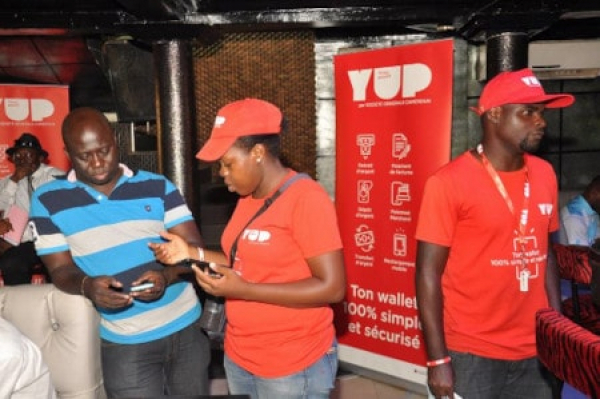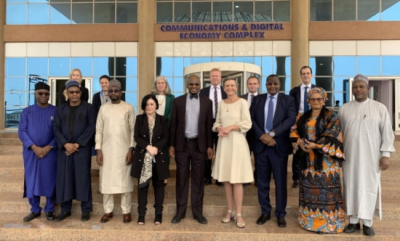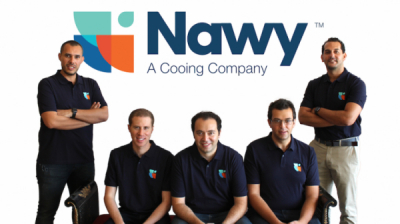
Finance (103)
Kenyan telecom operator Safaricom and Islamic bank Gulf African Bank recently launched a Sharia-compliant mobile loan called Halal Pesa.
Thanks to the solution, users can receive up to Ksh20,000 loans fully repayable within 30 days with a 5% “commodity Murabaha margin.”
For Safaricom, Halal Pesa is “the first Sharia-compliant mobile and digital financial solution” in Kenya.
“Kenya is now a highly innovative, interconnected, and fast-paced community that requires solutions on the go. All our digital offerings, including Halal Pesa, seek to directly address this aspect. Our current strategy is focused on digitization for financial inclusion,” said Abdalla Abdulkhalik, Managing director of Gulf African Bank.
French banking group Societe Generale is ending its mobile money service YUP, created in 2017, in Côte d'Ivoire, Senegal, Burkina Faso, Cameroon, Guinea, Ghana, and Madagascar. The information was disclosed in a letter sent on March 1, 2022, by Nicolas Pichou, CEO of Societe Generale Cameroon, to his employees.
"Dear colleagues, 5 years ago, anxious to promote financial inclusion and facilitate access to innovative fund transfer means by notably dematerializing companies’ payment flow, the AFMO (Ed.note: Africa and the Middle East) Business Unit launched an electronic money service and created a dedicated entity YUP. Despite all the efforts made by the YUP teams in the 7 geographic zones concerned, including Cameroon, to develop our market share and improve the experience, the service has not succeeded in creating a viable model and the market outlooks do not comfort us in planning for the continuation of this segment. In that circumstance, Societe Generale Group, in consultation with all its local subsidiaries, took the difficult decision to stop the operations of YUP in all the geographic areas where it was deployed,” explains the letter sent by Nicolas Pichou.
In short, despite all the resources deployed over the past five years to capture shares of the highly dynamic mobile money market, YUP has proven unprofitable for Société Générale. In the case of Cameroon, the reason for this failure is the undisputed supremacy of the country's two main mobile operators (MTN and Orange namely) in this market. Those operators entered the local market almost ten years before YUP and have had the opportunity to establish a network that leaves almost no room for newcomers.
Over 19 million active mobile money accounts
In July 2021, when celebrating its 10th anniversary in the Cameronian mobile money market, Orange Cameroon claimed it was controlling 70% of the market share, with cumulative transactions amounting to CFA800 billion yearly. "When I say cumulative transaction values, I mean deposits and withdrawals, money transfers, bill payments, salary payments, and everything else that is merchant payment, etc. Our daily cumulative transactions amount to CFA3 million,” explained Emmanuel Tassembedo, director of Orange Money Cameroon.
MTN Cameroon is a bit cautious as far as its mobile money market share is concerned. Its executives claim MTN Mobile Money had 5.6 million active subscribers in the second quarter of 2021, at least 168,000 points of presence across the country, including 108,000 merchant points and 60,000 distribution points.
Both operators offer innovative services like insurance subscriptions and tax payments. According to the Ministry of Finance, in Cameroon, close to CFA10 billion of taxes were paid through the two mobile money operators.
Let’s note that Cameroon is CEMAC’s leader in the mobile money segment. According to data published by the central bank BEAC, in 2020, there were 19.1 million active mobile money accounts in Cameroon. This was 64.8% of the 30.1 million mobile money accounts active in the CEMAC region whose membership includes six countries (Cameroon, Congo, Gabon, Chad, the Central African Republic, and Equatorial Guinea). During the period, mobile money service providers active in Cameroon carried out 73.13% of the transactions recorded in the community space.
Brice R. Mbodiam
Achieving a digital economy is a priority in the New National Development Plan (NDP) 2021-2025, unveiled in December 2021 by President Muhammadu Buhari. Several international partners expressed intentions to support the project.
The European Union has announced an investment of €820 million to support Nigeria’s digital transformation over the next three years. The information was unveiled on Saturday, February 12 in Lagos by an adviser to the Executive Vice President of the European Commission, Alejandro Cainzos. This was during a roundtable discussion with Nigerian youth organized at the Tony Elumelu Foundation.
“The EU will support building the fiber optic cables and data centers needed to improve Nigerian’s access to high-speed connectivity. The European Investment Bank (EIB) will invest €100 million to expand secure 4G connectivity in Lagos and Ogun States and triple the national data capability,” said Alejandro Cainzos.
He said the EU will also support the digitization of the Nigerian administration to enable citizens to benefit from better and more easily accessible public services. €250 million will be invested to strengthen Nigeria's digital identity infrastructure with the highest data protection standards and support the creation and scaling of tech startups and stimulate innovative solutions for Nigeria's society and economy.
The EU will help develop regulatory frameworks with the highest standards of privacy, security, and cybersecurity, while promoting an open Internet and a digital market that respects citizens' rights, Alejandro Cainzos said.
The EU investment in Nigeria came two days after the organization announced an investment of more than €150 billion in Africa over the next five years. European Commission President Ursula von der Leyen was in Dakar on Thursday, February 10, just days before the European Union-African Union summit to be held on February 17-18 in Brussels, Belgium.
Last year, the Nigerian government unveiled a new National Development Plan 2021-2025 which places digital technology at the heart of many growth issues.
Muriel Edjo
Seven months after an initial investment, the Sawiris family office made a follow on investment in Egyptian propTech company Nawy. In a February 13 statement, the beneficiary reported it has raised $5 million in seed capital.
The resources will be used to support its expansion strategy in North Africa and improve investment in new technologies and the digital (artificial intelligence, machine learning, etc.).
The startup, which facilitates and simplifies the process of buying and selling real estate online, claims to have helped more than 60,000 people find a home to date. Nawy also says it has sold over $200 million worth of real estate through its platform.
"We were one of the first investors in Nawy because we saw the potential of the company and shared its ambition. We immediately increased our investment when we realized how fast they were expanding and the trajectory of the company coming to fruition. We are very excited about the future, especially as Nawy expands its services and continues its momentum in the real estate market," commented Onsi Naguib Sawiris, head of Sawiris family office who led the investment in Nawy.
As a reminder, the Sawiris family office led an undisclosed seed funding in Nawy in July 2021. The money was used to strengthen the company's technology, increase services and increase staff. In its July 2021 forecast, Nawy planned to end the year with 300% revenue growth.
Chamberline Moko
The online library YouScribe unveiled plans to strengthen its presence in Africa. Yesterday February 8, it announced it has secured €5 million from the French Banque des Territoires.
The startup will use the money to accelerate its expansion on the continent, especially in the ten countries (Côte d’Ivoire, Senegal, Morocco, Mali, South Africa, Cameroon, Tunisia, Burkina Faso, DRC, and Madagascar) where it already operates. YouScribe also eyes seven new markets on the continent and plans to expand its collection with new books, and diversify payment methods.
According to Maud Franca, deputy director of the Program of Investments for the Future at the Banque des Territoires, the investment aims to support the profound changes that the French-language book and publishing sectors are experiencing with digital technology.
"YouScribe is a response to the challenges that must be met collectively to provide alternative offers to the large online library platforms, often foreign, and to support publishers and authors in the French-speaking world, while also thinking of the younger generations, who are fans of social media and mobile applications,” she said.
The number of French speakers in the world is expected to increase from more than 300 million currently to 750 million in 2050, making French the second most spoken language after Mandarin, according to the Observatoire démographique et statistique de l'espace francophone (ODSEF). The latter estimates that more than 70% of French speakers will be Africans and Africa will have more than 90% of young French speakers aged 15-29. However, the lack of distribution infrastructure and the high cost of paper books could accentuate the low access to reading for Africans.
The relevance of the project earned YouScribe the Ernst & Young Entrepreneur Award in 2013. In 2015, the initiative received the 2017 Digital Africa Challenge Award, organized by AFD, French Tech, and Bpifrance. In 2018, Orange Africa chose the startup to promote access to reading in countries where books are poorly distributed.
By the end of 2021, YouScribe was already claiming nearly 700,000 subscribers, up 100% from 2020. By 2025, the online library with more than one million books, audiobooks, and educational digital documents targets several million subscribers, 80% of which will be in Africa.






